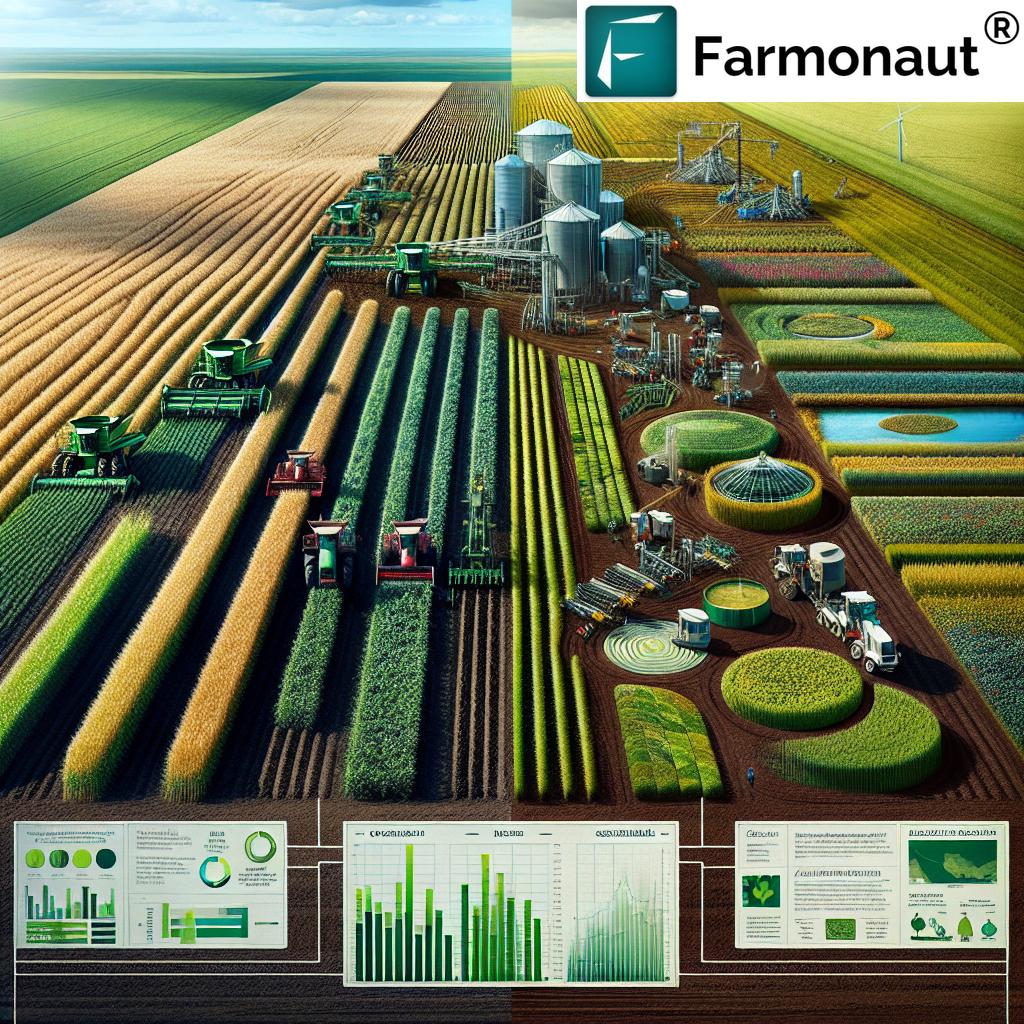Sustainable Farming in Alberta: Boosting Profitability with Climate-Smart Agricultural Technologies
“Precision agriculture techniques can reduce fertilizer use by up to 30% while maintaining or increasing crop yields.”
In the heart of Canada’s prairies, Alberta’s farms and ranches are at the forefront of a revolutionary shift towards sustainable agriculture. As stewards of the land, we recognize the urgent need to balance environmental stewardship with profitability. This blog explores how adopting climate-smart farming methods and cutting-edge agricultural technologies can optimize farm resources, reduce environmental impact, and enhance farm profitability in Alberta’s unique agricultural landscape.
The Need for Sustainable Farming in Alberta
Alberta’s agricultural sector is a cornerstone of the province’s economy, producing a wide variety of grain, oilseed, and pulse crops. However, like many regions worldwide, we face significant challenges due to climate change, soil degradation, and the need to increase food production sustainably. These challenges have sparked a movement towards more sustainable farming practices that not only protect our planet but also boost the bottom line for farmers.

Sustainable farming practices in Alberta encompass a range of methods that aim to:
- Conserve water resources
- Improve soil health
- Reduce greenhouse gas emissions
- Minimize the use of chemical inputs
- Enhance biodiversity
- Increase farm resilience to weather extremes
By adopting these practices, we not only contribute to environmental conservation but also set the stage for long-term economic sustainability in our agricultural sector.
Climate-Smart Agricultural Technologies: A Game-Changer for Alberta Farms
The integration of climate-smart agricultural technologies is revolutionizing farming operations across Alberta. These innovative solutions allow farmers to make data-driven decisions, optimize resource use, and adapt to changing environmental conditions. Let’s explore some of the key technologies that are making a significant impact:
1. Precision Agriculture Techniques
Precision agriculture is at the heart of sustainable farming in Alberta. By leveraging GPS technology, remote sensing, and data analytics, farmers can manage their fields with unprecedented accuracy. This approach allows for:
- Variable-rate application of inputs: Fertilizers, pesticides, and water are applied precisely where needed, reducing waste and environmental impact.
- Minimized overlap in field operations: GPS-guided machinery ensures efficient coverage, saving time, fuel, and reducing soil compaction.
- Targeted pest management: Early detection and localized treatment of pest issues minimize the use of pesticides.
These precision techniques not only reduce input costs but also contribute to higher yields and improved crop quality.
2. Soil Health Management
Maintaining healthy soils is crucial for sustainable agriculture. Advanced soil testing and management technologies help Alberta farmers:
- Analyze soil composition and nutrient levels with greater accuracy
- Monitor soil moisture content in real-time
- Implement targeted soil improvement strategies
By understanding and improving soil health, farmers can enhance crop resilience, increase water retention, and reduce the need for synthetic inputs.
3. Efficient Fertilizer Application Methods
The 4Rs principle (Right source, Right rate, Right time, Right place) is transforming fertilizer use in Alberta. Smart fertilizer application technologies include:
- Sensor-based applicators that adjust fertilizer rates on-the-go
- Slow-release fertilizers that match nutrient release with crop uptake
- Precision placement techniques that reduce nutrient runoff
These methods significantly reduce fertilizer waste, decrease environmental impact, and improve nutrient use efficiency.
4. Climate-Smart Crop Management
Adapting to Alberta’s changing climate requires smart crop management strategies:
- Sustainable crop rotation: Diversifying crops improves soil health, breaks pest cycles, and enhances farm resilience.
- Cover cropping: Planting cover crops between main crop seasons protects soil, fixes nitrogen, and increases organic matter.
- Drought-resistant varieties: Selecting crop varieties adapted to local conditions improves yield stability in the face of climate variability.
These practices not only help mitigate climate change impacts but also contribute to long-term soil fertility and farm productivity.
Agri-Tech Innovations Transforming Alberta’s Farms
The agricultural technology landscape is rapidly evolving, offering Alberta farmers powerful tools to enhance sustainability and profitability. Here are some cutting-edge innovations making waves in our province:
1. Satellite-Based Crop Monitoring
Satellite technology is revolutionizing how we monitor and manage our crops. Platforms like Farmonaut provide farmers with real-time insights into crop health, allowing for timely interventions and optimized resource allocation. Benefits include:
- Early detection of crop stress and disease
- Accurate yield predictions
- Improved irrigation management

By leveraging this technology, Alberta farmers can make data-driven decisions that enhance crop performance while minimizing environmental impact.
2. AI-Powered Farm Management Systems
Artificial Intelligence (AI) is transforming farm management in Alberta. AI-driven systems can:
- Analyze vast amounts of data to provide actionable insights
- Predict weather patterns and their potential impact on crops
- Optimize irrigation schedules based on crop needs and weather forecasts
These intelligent systems help farmers stay ahead of challenges and make informed decisions that boost productivity and sustainability.
3. IoT Sensors and Smart Farm Equipment
The Internet of Things (IoT) is bringing unprecedented connectivity to Alberta’s farms. Smart sensors and connected farm equipment offer:
- Real-time monitoring of soil moisture, temperature, and nutrient levels
- Automated irrigation systems that conserve water
- Precision planting and harvesting equipment that minimizes waste
By integrating these technologies, farmers can achieve new levels of efficiency and resource optimization.
The Economic Benefits of Sustainability in Alberta Agriculture
“Sustainable farming practices can boost farm profitability by 15-20% through reduced input costs and improved resource efficiency.”
Embracing sustainable farming practices isn’t just good for the environment—it’s a smart business decision for Alberta’s farmers. The economic benefits of adopting climate-smart agricultural technologies include:
- Reduced input costs: Precision agriculture techniques can significantly lower expenses on fertilizers, pesticides, and water.
- Improved crop yields: Sustainable soil management and optimized inputs lead to better crop performance and higher yields.
- Enhanced product quality: Sustainable practices often result in higher-quality crops that command premium prices in the market.
- Increased resilience: Diverse cropping systems and improved soil health make farms more resilient to weather extremes and market fluctuations.
- Access to niche markets: Sustainably produced crops can tap into growing markets for environmentally friendly products.
Let’s take a closer look at how these economic benefits translate into real-world gains for Alberta’s farmers:
| Farming Practice | Traditional Method | Climate-Smart Approach | Potential Benefits |
|---|---|---|---|
| Fertilizer Application | Uniform application across fields | Variable-rate application using GPS-guided machinery | 20-30% reduction in fertilizer use; 5-10% yield increase |
| Irrigation | Fixed schedule irrigation | Sensor-based precision irrigation | 30-50% water savings; 15% yield increase |
| Crop Rotation | Limited rotation or monoculture | Diverse, climate-adapted crop rotation | 10-15% reduction in pest control costs; improved soil health |
| Soil Management | Conventional tillage | Conservation tillage or no-till practices | 50-80% reduction in fuel costs; increased soil carbon sequestration |
As the table demonstrates, the adoption of climate-smart practices can lead to significant cost savings and yield improvements, directly impacting the bottom line for Alberta’s farmers.
Overcoming Challenges in Adopting Sustainable Practices
While the benefits of sustainable farming are clear, Alberta farmers may face challenges in adopting these practices. Common obstacles include:
- Initial investment costs for new technologies
- Learning curve associated with new farming methods
- Uncertainty about the return on investment
- Resistance to change from traditional practices
To address these challenges, we recommend:
- Education and training programs: Providing farmers with the knowledge and skills needed to implement sustainable practices effectively.
- Financial incentives: Government support and private sector initiatives to help offset initial costs of adopting new technologies.
- Demonstration farms: Showcasing successful implementations of sustainable farming practices to inspire and inform other farmers.
- Collaboration with research institutions: Partnering with universities and agricultural research centers to validate and refine sustainable farming methods for Alberta’s specific conditions.
The Role of Technology Providers in Sustainable Agriculture
Technology providers play a crucial role in advancing sustainable agriculture in Alberta. Companies like Farmonaut offer innovative solutions that empower farmers to implement climate-smart practices effectively. Here’s how technology providers contribute to the sustainable farming ecosystem:
- Providing accessible tools: Offering user-friendly platforms that make advanced agricultural technologies accessible to farms of all sizes.
- Data-driven insights: Delivering actionable insights from complex data sets to guide farm management decisions.
- Continuous innovation: Investing in research and development to create new solutions that address emerging challenges in sustainable agriculture.
- Integration support: Helping farmers seamlessly integrate new technologies into their existing operations.
- Customization for local conditions: Adapting solutions to meet the specific needs of Alberta’s diverse agricultural landscape.
For example, Farmonaut’s satellite-based crop monitoring system provides Alberta farmers with valuable insights into crop health, allowing for more precise management of resources and inputs. This technology aligns perfectly with the principles of sustainable farming, offering a powerful tool for optimizing farm operations while minimizing environmental impact.
Explore Farmonaut’s solutions:
The Future of Sustainable Agriculture in Alberta
As we look to the future, the path towards sustainable agriculture in Alberta is clear. By embracing climate-smart farming methods and leveraging cutting-edge agricultural technologies, we can create a more resilient, profitable, and environmentally friendly agricultural sector. Key trends shaping the future include:
- Increased adoption of precision agriculture: More farms will integrate data-driven decision-making into their operations.
- Expansion of regenerative farming practices: Techniques that improve soil health and sequester carbon will gain prominence.
- Growth in AgTech startups: Alberta’s innovation ecosystem will drive the development of new sustainable farming solutions.
- Enhanced traceability: Blockchain and other technologies will improve supply chain transparency and food safety.
- Focus on water conservation: Advanced irrigation technologies will become crucial in managing Alberta’s water resources.
By staying at the forefront of these trends, Alberta’s agricultural sector can lead the way in sustainable farming practices, ensuring a prosperous future for our farms and our planet.
Conclusion: A Sustainable Path Forward for Alberta’s Farms
The journey towards sustainable farming in Alberta is not just an environmental imperative—it’s a pathway to enhanced profitability and long-term success for our agricultural sector. By adopting climate-smart agricultural technologies and sustainable farming practices, we can:
- Reduce our environmental footprint
- Improve farm productivity and resilience
- Enhance the quality of our agricultural products
- Secure a competitive edge in global markets
- Contribute to food security and rural prosperity
As we navigate the challenges of climate change and evolving consumer expectations, the integration of sustainable practices and innovative technologies will be key to ensuring the continued success of Alberta’s farms and ranches. By embracing these changes, we’re not just adapting to new realities—we’re actively shaping a more sustainable and profitable future for agriculture in our province.
The path to sustainable farming may seem daunting, but with the right tools, knowledge, and support, Alberta’s farmers are well-positioned to lead the way in this agricultural revolution. Let’s work together to build a more sustainable, resilient, and prosperous agricultural sector for generations to come.
FAQ: Sustainable Farming in Alberta
Q: What are the main benefits of adopting sustainable farming practices in Alberta?
A: The main benefits include reduced input costs, improved soil health, increased crop yields, enhanced resilience to climate change, and potential access to premium markets for sustainably produced goods.
Q: How can precision agriculture techniques help Alberta farmers?
A: Precision agriculture helps by optimizing resource use, reducing waste, improving crop yields, and minimizing environmental impact through targeted application of inputs and data-driven decision-making.
Q: What role does soil health play in sustainable farming?
A: Healthy soils are fundamental to sustainable farming as they improve water retention, increase nutrient availability, enhance crop resilience, and contribute to carbon sequestration.
Q: How can Alberta farmers get started with sustainable farming practices?
A: Farmers can start by implementing simple practices like cover cropping or reduced tillage, and gradually adopt more advanced technologies like precision agriculture tools. Consulting with local agricultural extension services and technology providers can provide valuable guidance.
Q: Are there financial supports available for Alberta farmers transitioning to sustainable practices?
A: Yes, various government programs and private sector initiatives offer financial support, grants, and incentives for farmers adopting sustainable practices. It’s advisable to check with provincial and federal agricultural departments for current programs.






